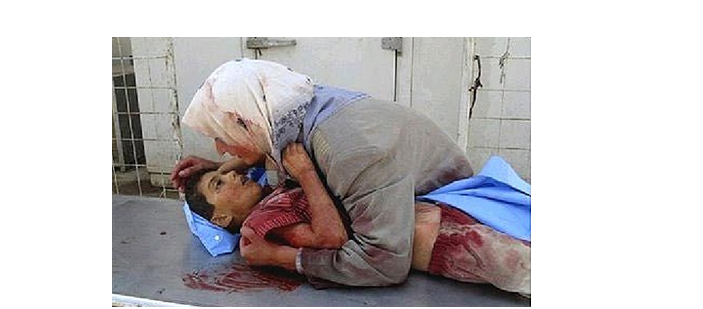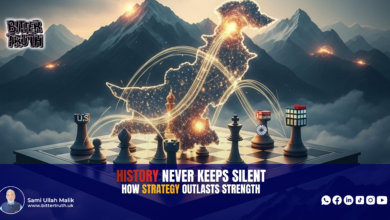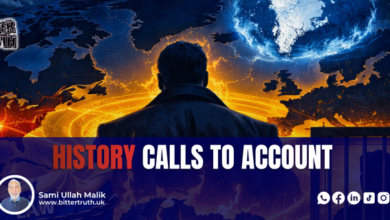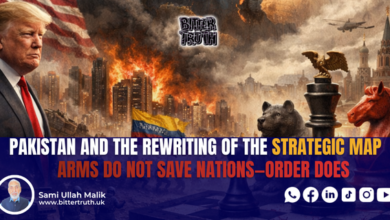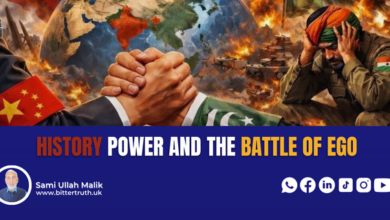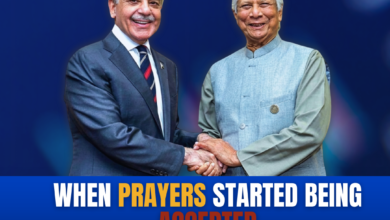The Great Crime
Where are the humanitarian champions?
Who dares to trade with God? Islamic festivals, particularly Eid, offer the perfect opportunity for such a trade – a trade where in exchange for a bundle of sins and mistakes, one receives a package of rewards and forgiveness with easy and minimal conditions. However, the checkpoints of greed, selfishness, hypocrisy, deceit, and lust impoverish and hollow out a person before they can even reach the heavenly utility store. During these Islamic festivals, people generally treat God the same way a disobedient child treats their mother. No one seeks the mother’s advice, yet everything is done in her name. The mother’s practical role is to sit respectfully in a corner while everyone comes to seek her blessings, touches her hand for a moment, and moves on.
God’s creation prefers to sell His name rather than be sold by His hands. Billions of rupees are spent on advertising in His name. Followers sell luxurious and simple Hajj and Umrah packages to other followers, with money going into their pockets and rewards supposedly going into yours. Every odd and unsellable item of the year can be easily offloaded during Ramadan and Hajj to the worshippers at inflated prices. The plunder and deceit associated with Hajj are unparalleled. During Ramadan and Hajj, Pakistani beggars are found in the largest numbers in the holy cities, prompting the Saudi government to formally request Pakistan to curb this disgraceful and serious issue. While the local media in Saudi Arabia has shown some restraint, neighboring countries have reported it with such embellishment that it’s embarrassing to even watch.
In Pakistan, once again, several agents have absconded with the lifelong savings of poor individuals under the pretext of Hajj. We all know that the current astronomical costs of performing Hajj consume a lifetime’s savings. Meanwhile, all edible and non-edible product brands, adorned in green turbans, dive into the Eid season’s marketplace with enticing offers, ready to extract the last coin from a simple Muslim’s pocket. A vendor who swears by God and the Prophet to sell bananas at 120 rupees per dozen, while they cost only 40 rupees per dozen, is also a Muslim. So is the customer who, after much deliberation, pulls out a few dirty notes and coins to buy six bananas for his children.
From Chand Raat to Eid and from the Night of Arafah to Eid ul-Adha, talk to your loved ones for just 1.99 rupees. For the Eid rewards call package, call now at 4200… and download your favorite naats, hamds, Hajj talbiyahs, and azan ringtones, and enjoy the rewards with both hands. What? You can’t sleep after watching late-night indecent TV shows and movies, and have trouble waking up for Fajr prayers? Here’s the new powerful Sohrab spray… all through Ramadan and Dhul-Hijjah, mosquitoes and fleas will stay away like Satan… During Ramadan and the special days of Hajj, why shouldn’t the breath of a fasting person or a pilgrim smell pleasant? We bring you special miswaak toothpaste, which keeps your mouth free from ten types of dangerous germs and fragrant from dawn till dusk, and during the massive gatherings of Hajj. Now, your blood pressure won’t fluctuate? Don’t forget to use Hakim Budhun’s tried and tested Khameera Zanzibar to avoid fatigue during Hajj… buy three bottles and get one bottle of Sharbat-e-Ruh Afza free and eat to your heart’s content the plentiful meat and rich foods during Eid ul-Adha without fear of indigestion and sour burps with ‘Baba Churan’ or ‘Qasuri Phakki’ available. And yes! If you need to hide the national wealth looted with both hands, you already have a long list of banks in Dubai, London, Switzerland, and other European countries. And those ready to assist you in this task are already standing by, ready to serve you with folded hands.
We have yet to forget the scenes from Ramadan when designers wearing sherwanis and caps, heavily made-up clowns, signed multi-million-rupee seasonal contracts in God’s name and sat on TV pulpits singing songs of humility, piety, and righteousness. With solemn faces, they preached love for the poor, compassion for orphans, and closeness to the needy. The mention of the Prophet Muhammad’s (PBUH) life of hardship and simplicity in the luxurious TV sets during Iftar and Sahar transmissions was so profound that fasting viewers would often drop their morsels in disbelief. Now, the life of Prophet Ibrahim (AS) and the sacrifice of his son is being discussed in such a way that viewers are calling organizations to fulfill their sacrificial duties during commercial breaks, saying, “Who wants to bother with the hassle of visiting markets and bargaining with butchers when the meat can be delivered straight to your door? Just make sure your fridge and freezer are empty and clean.”
My Merciful Lord watched these scenes with interest during the thirty days of Ramadan and the first ten days of Dhul-Hijjah, waiting and smiling. Yet, on Eid, He distributed all His blessings among His ungrateful servants in the hope that perhaps by the next Eid, someone might find their way to Him. But what have we done? To appease Allah, we brought cows, bulls, or calves adorned with garlands to the sacrificial ground amidst media frenzy, and with cameras as witnesses, turned the Sunnah of Ibrahim (AS) into images to claim piety in society. Meanwhile, the media busied itself with boosting ratings through Eid programs.
According to a UN report, 600,000 children in Gaza are on the brink of death from hunger, ready to meet their Lord, where they will surely complain about our hypocrisy with their innocent faces. These 600,000 starving bodies are writhing in agony, with many children unaware of their parents’ whereabouts, possibly already in the presence of their Lord. Thousands of surviving children are dying in their parents’ arms amidst the horrific bombings. We spend all our energy sharing pictures and videos of these helpless ones on social media, but how many of us see their pain reflected in the faces of our own children?
The UN report screams that more than 15,000 children have been killed by Israeli bombings, 17,000 are orphaned, yet the self-proclaimed champions of human rights in developed countries take no notice. How can we forget these children? Never. All those who call themselves Muslims are responsible for this barbaric slaughter if they remain immersed in their luxuries with blind eyes and dead consciences. Remember, we will never forget this atrocity, we will not forget this brutal killing, we will never forget the injustices done to them. The OIC, which failed to stop this massacre, is equally responsible. We will also never forget the great crime of all Muslim rulers and powerful generals who stood by silently.
What do a mother and God have today except to wait for their worldly children?
افلاس ہے رقص کناں جن کی ٹوٹی پھوٹی کٹیاوں میں
تم اپنی عید منا کر ان کو بھول نہ جانا دعاؤں میں
وہ افغانی کہساروں میں جن کے ماں باپ شہید ہوئے
ان معصوموں کی چیخیں ہر سو، پھیل رہی ہیں فضائوں میں
بھارت کے ظلم کی دھوپ میں وہ کشمیری قافلے پا پیادہ
ہے جن کی طلب کہ آکر بیٹھیں ، پاکستان کی چھائوں میں
وہ بنگلہ دیشی کیمپوں میں جو روز دعائیں کرتے ہیں
اس پاکستان سے الفت کی زنجیر ہے جن کے پاؤں میں
اس مسجد اقصی کی چھت پر اور صحن میں جن کا بسیرا ہے
وہ سارے کبوتر جو محصور ہیں ،غزہ کی خوں آشام بلاؤں میں
تم اپنی عید منا کر ان کو بھول نہ جانا دعاؤں میں
Those whose poverty dances in their broken huts,
Don’t forget them in your prayers after celebrating your Eid.
Those Afghan children whose parents were martyred,
Their innocent cries are echoing everywhere.
Those Kashmiri caravans walking barefoot under India’s oppression,
Longing to find refuge in Pakistan’s shade.
Those in Bangladeshi camps who pray daily,
Their feet bound by the chains of love for Pakistan.
The doves on the roof and courtyard of Al-Aqsa Mosque,
Trapped amidst Gaza’s bloodthirsty horrors.
Don’t forget them in your prayers after celebrating your Eid.
Saturday 15 June 2024

